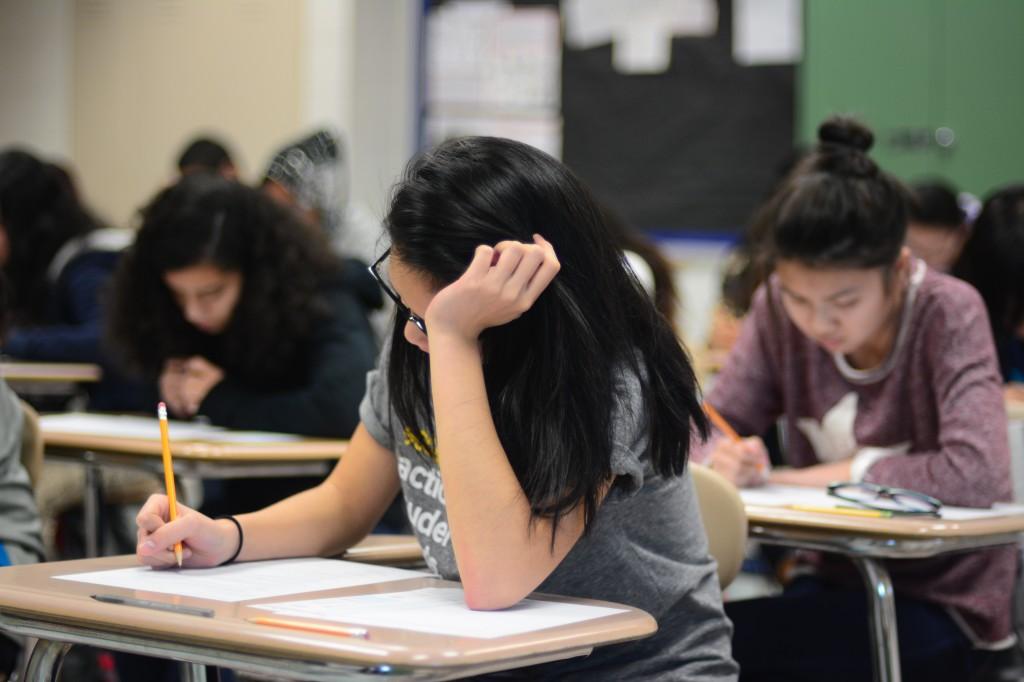
Last semester, the school administration introduced a new testing schedule that received widespread criticism from students. Last year, a weekly schedule allowed departments to only give tests during specific weeks. In September, the new schedule allowed teachers to give tests during specified days, making possible about ten tests per major subject area per semester. At the start of the spring semester, the administration released a new four-day rotating testing schedule. This updated system combines aspects of past schedules but ensures that there are six testing windows per semester rather than ten.
A new testing schedule document, shared by the administration, explains the system: “Testing days [now] run in sequences of four, which is similar to the weekly schedule of previous years but offers similar flexibility to the daily schedule of last semester. By having longer windows in which teachers can offer tests and quizzes, we believe that testing will be more spread out.” This means that there are four day windows in which only certain departments can give a test. After the four days are up, other departments can give a test. There are three testing groups: A groups, B groups, and C groups. Last semester, there were two-day windows, so an “A” department could give a test during one of those two days and then it would be about four or five school days before those departments could give another test. Now, it’s around eight-to-ten school days before departments can give new tests.
According to Assistant Principal of Organization Ellen Fee, one prominent reason why the testing schedule was changed is that “Students felt by October [of 2024] they were being tested more often and they felt like the teachers were using every opportunity of their testing days to test them.”
Ms. Fee said that the school’s “Instructional Leadership Team,” which includes teachers from multiple departments and all assistant principals, met several times to look through Student Union and faculty survey results, address the issues, and implement improvements to the former testing schedule.
“The priority [of the new testing schedule] is getting two groups of people to agree and compromise on a number… So, we’re trying to get the most people to agree that this is a good system, but we will have people like teachers say it is not enough and students that say I am stressed out or there are too many tests,” said Ms. Fee.
According to Assistant Principal of English Ryan Dunbar, the purpose of the fall testing schedule was to prevent overtesting. Instead, he said, “it was pretty clear that this calendar was not doing that. If anything, it was encouraging overtesting and going against what it was meant to do.”
He said the new schedule should encourage different types of assessments: “Now that you can’t give as many tests, the hope is that maybe you’ll give a writing piece or a project that students can complete to show they are meeting the standards—just in different ways.”
Students had varied reactions to the new schedule.
Some students said the schedule succeeded in reducing stress and overtesting.
Freshman Nabeeha Saeed said, “In the previous schedule I would have Chemistry and Spanish tests on the same days, but this week, for the first time in a long time, I had a Chemistry test today and a Spanish test on Thursday.”
Senior Joyce Xie said, “Unlike the fall semester, I don’t feel as overwhelmed, so I’m able to spend more time focusing on each subject individually.”
Some students said the changes to the previous schedule were small and did not have an immense impact on their academic lives.
Sophomore Katherine Torres said, “I think the testing schedule improved slightly but could be better. It’s less common for me to have many tests lined up back to back each week, but it can still happen. Everything about it only feels slightly altered.”
“Personally, I wasn’t aware of the new testing schedule and don’t think it has impacted my life in any way. I just find myself studying when I need to for an upcoming test,” said Junior Anita Chen.
Freshmen Syndey Zhang said, “I could see how having a testing schedule to organize things could make it so that tests do not overlap, but I find that having a testing schedule makes things feel rushed since teachers prefer to do the tests as soon as possible during their week and sometimes I do not feel prepared enough to take the test.”
According to the new testing schedule’s “Statement of Purpose,” “It is the philosophy of this school administration that tests are not the only way to determine if a student is learning, and we believe that students should not be overburdened with multiple overlapping tests/quizzes.”
Social studies teacher and Senior Advisor Blayne Gelbman said he supports this shift, saying, “I think multiple-choice tests are silly and can’t test student’s growth, and I operate based on projects.”
He also said that he has heard varying reactions from teachers. “I’ve heard both positive and negative things. That’s just how it’s always going to be,” Mr. Gelbman said.
“I would honestly prefer the testing schedule from [the 2023-2024 school] year. The weekly schedule made it easier to remember and efficiently prepare for tests. It also felt less overwhelming and allowed me to focus more time on getting better at certain topics instead of cramming days before,” said Katherine.
Some students said changes could be made to avoid other issues. While some are concerned about too many tests, others are concerned about longer tests.
Sophomore Pekko Hau said that further changes to the schedule could ensure that “teachers don’t always have to assign double-band tests [like in the AP Physics Hybrid] to make up for the amount of time between certain testing days.”






























